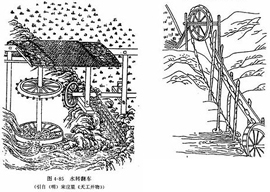Mesopotamia is also known as “Land of Rivers”. The geography of Mesopotamia did not provide much scope for agriculture. So much of the agriculture was depended upon the irrigation and good drainage.

However it was blessed with the yearly flooding Tigris and Euphrates rivers. There water was a boon for the irrigation in Mesopotamia. They were main source of water for the purpose of irrigation in the Mesopotamia.
Mesopotamia had a large amount of silt. This silt was constantly a hindrance in the man made irrigation system. The frequent floods were also an obstacle in the irrigation of Mesopotamia. The irrigation in Mesopotamia was responsible for the increase in food supply in Mesopotamia.

The land which was near to the rivers was fertile and the land farther from the rivers was dry and largely uninhabitable. This was the main reason why irrigation in Mesopotamia was of utmost importance.
Another reason why irrigation in Mesopotamia was important was that the floods which came from the melting of the snows of the Turkish mountains came in late spring or early summer. It was too late for spring crops and too early for the autumn crops.
As there wasn’t much of rainfall, much of the irrigation in Mesopotamia was depended upon the waters from the rivers. Irrigation in Mesopotamia was so very well managed that the top soil did not washed away and the minerals did not leach deep into the soil. Therefore, it was possible to maintain the fertility by the employment of soil-management practices.
The area of Mesopotamia had a large concentration of salt deposits. It was the result of this high saline content in the soil that irrigation in Mesopotamia in this region was more complex and difficult. In addition to this, this area suffered from constant political instability and wars.
Wooden plows were used during the irrigation in Mesopotamia to soften the soil before planting certain crops like barley, onions, grapes, turnips and apples. It was the consequence of the skills used in the irrigation in Mesopotamia that the farmers did not depend upon the slaves to complete the work in the farms.